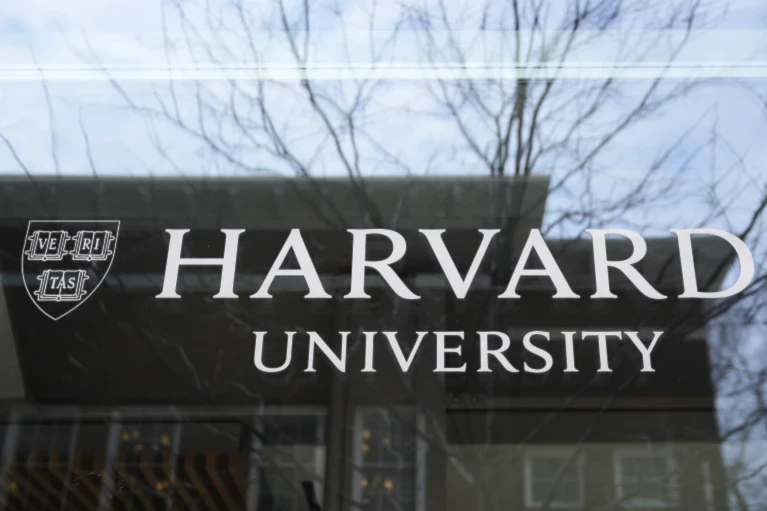Trump administration bars Harvard from federal grants
Trump's education secretary announces that Harvard University is banned from receiving federal grants due to alleged failures in legal and ethical responsibilities.
-

The Harvard University logo is displayed on a building at the school, April 15, 2025, Cambridge, Massachusetts (AP/Charles Krupa)
US President Donald Trump's administration has formally barred Harvard University from receiving any new federal grants, intensifying a growing standoff with the elite institution over its alleged failure to address antisemitism and comply with government oversight demands.
Late last month, the Trump administration escalated a dispute with Harvard by threatening to withdraw over $1 billion in health research funding after the university publicly rejected a confidential list of federal demands.
Education Secretary Linda McMahon announced the decision in a letter sent to Harvard's president and posted publicly on Monday. In it, she declared that Harvard “should no longer seek GRANTS from the federal government, since none will be provided,” citing the university’s alleged “failure to abide by its legal obligations, its ethical and fiduciary duties, its transparency responsibilities, and any semblance of academic rigor.”
The Trump administration has frozen $2.2 billion in federal funding already earmarked for Harvard, with as much as $9 billion in total under review. The move follows weeks of conflict between the White House and top universities over accusations of institutional tolerance of antisemitic speech and activities on campus.
Federal funding frozen as Harvard resists political oversight
The decision marks a new phase in the Trump administration’s pressure campaign against higher education institutions, particularly those unwilling to accept federal oversight of internal policies such as admissions, hiring, and campus political activity.
Harvard, which holds a $53.2 billion endowment, the largest of any US university, has consistently rejected calls for increased government supervision, drawing repeated attacks from the Trump camp.
Harvard will continue to defend against illegal government overreach aimed at stifling research and innovation that make Americans safer and more secure. Read the full statement: https://t.co/UIPoI5wZrr
— Harvard News (@harvardnews) May 6, 2025
The university's refusal has been framed by Trump officials as emblematic of a broader “lack of accountability” within academia, which they argue has become hostile to conservative viewpoints and too lenient on expressions critical of "Israel."
Linda McMahon slams Harvard's 'ethical and legal failures'
In her letter, McMahon accused Harvard of not just administrative non-compliance but also moral failure. This "marks the end of new grants for the University," she wrote, claiming that Harvard's actions were inconsistent with federal standards for grant eligibility.
McMahon, a former business executive and public face of the administration’s education agenda, has taken a hardline stance against what she describes as “elite hypocrisy” in higher education. Her letter echoes Trump’s campaign rhetoric, framing the university as emblematic of liberal bias and institutional decay.
Crackdown on universities expands under Trump’s 2024 campaign
Trump’s broader campaign against universities has focused on accusations of unchecked anti-Semitism, particularly in the wake of nationwide protests over the Israeli war on Gaza. The administration has linked such protests to alleged support for Hamas and used that framing to justify sweeping crackdowns.
The measures include freezing funds, threatening universities' tax-exempt status (like Harvard's), and investigating diversity programs intended to rectify systemic inequalities. Trump officials claim such initiatives discriminate against non-minority applicants and reinforce ideological bias.
Visa threats, diversity programs under fire in broader purge
Foreign students have also come under increased scrutiny. The administration has taken steps to revoke visas and deport international students allegedly involved in protests deemed sympathetic to Palestinian Resistance groups. This has raised alarms among civil liberties organizations and academic freedom advocates.
Last week, Columbia University student Mohsen Mahdawi was released from federal immigration custody. A US judge ruled last Wednesday that Mahdawi could not be deported while he challenges the Trump administration’s attempt to remove him over his pro-Palestinian activism.
Critics warn that the administration’s actions represent a coordinated assault on higher education, aimed at reshaping universities to align with the political goals of the White House. Academic leaders across the country have voiced concern that such policies risk undermining the autonomy and intellectual diversity of US institutions.

 4 Min Read
4 Min Read










